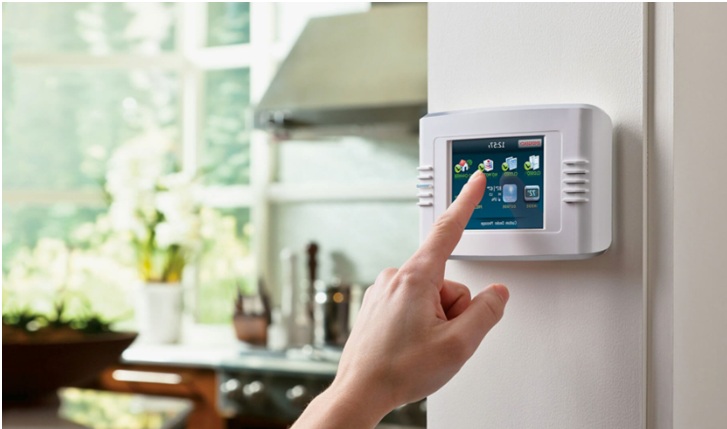Table of Contents
When smoke and carbon monoxide (CO) alarms are interconnected, they offer a heightened level of protection by alerting occupants to hazards in any room equipped with a smoke/CO alarm. Unlike traditional alarms that only detect within their immediate vicinity, interconnected systems provide comprehensive coverage throughout the home. Fire safety often receives insufficient attention until a crisis occurs. However, installing interconnected fire alarms is a proactive step that significantly enhances home safety. Fire alarms Manchester specializes in providing interconnected alarm solutions tailored to the needs of homeowners.
By investing in these systems, families can enjoy peace of mind knowing that every part of their home is monitored for potential dangers, reducing the risk of injury and property damage in the event of a fire or CO leak. In this article, we will delve into the benefits of interconnected fire alarms, dissecting their operational intricacies, and outlining essential factors to consider when installing them. In this article, we will delve into the benefits of interconnected fire alarms, dissecting their operational intricacies, and outlining essential factors to consider when installing them.
Full Home Coverage:
In the critical moments of a home fire, every second counts, often leaving mere minutes to escape. If a fire ignites on your home’s upper level while you’re in the basement, hearing the alarm can be challenging. However, with an interconnected smoke alarm system, when the upstairs alarm triggers, the one in the basement will sound simultaneously, ensuring you’re alerted no matter where you are. This vital feature bridges the gap between distant areas in the house and significantly increases your chances of a timely evacuation. According to the National Fire Protection Association (NFPA), a significant number of home fire fatalities in the United States occurred in rooms separate from the initial fire location.
Enhanced Safety
Interconnected smoke & fire alarms elevate home safety by delivering simultaneous alerts throughout the entire house, regardless of an individual’s whereabouts. This ensures that everyone is promptly informed in the event of a fire, facilitating swift action and evacuation. Unlike standalone fire alarms that only trigger in their immediate vicinity, interconnected systems create a unified safety net, leaving no room for blind spots. By eliminating the need to rely on hearing a distant alarm, occupants can respond swiftly and effectively to mitigate the threat of fire-related injuries or fatalities.
The comprehensive coverage offered by interconnected smoke or fire alarms extends beyond audible alerts. These systems can also integrate with smart home platforms, sending notifications to smartphones or tablets, further enhancing situational awareness and enabling remote monitoring capabilities. This interconnectedness not only enhances the safety of residents but also provides peace of mind, knowing that their home is equipped with a robust and reliable detection system.
Early Detection
Interconnected smoke alarm systems excel in early detection, swiftly identifying even the smallest traces of smoke or smoldering fires. This proactive approach to fire detection grants occupants valuable seconds or minutes to initiate evacuation procedures, potentially preventing injuries or property damage. Whether it’s a minor kitchen mishap or a slow-burning electrical fire, interconnected alarms act as vigilant sentinels, promptly sounding the alarm and alerting occupants to the impending danger.
Early detection capabilities of interconnected smoke or fire alarms are not limited to traditional smoke detection. Some advanced systems also incorporate multi-criteria detection technology, capable of identifying various types of fire signatures, including fast-flaming and slow-smoldering fires. By leveraging multiple detection methods, these systems further enhance their ability to detect fires quickly and accurately, providing occupants with timely warnings and maximizing their chances of a safe escape.
Redundancy
Interconnected smoke alarm systems boast built-in redundancy, ensuring continuous protection even in the face of individual alarm malfunctions or battery failures. In the event of a single alarm malfunctioning or its batteries depleting, the interconnected nature of these systems ensures that other alarms in the network remain operational. This redundancy significantly reduces the risk of gaps in coverage, safeguarding against potential vulnerabilities that could compromise overall fire safety.
Interconnected smoke alarms often feature self-testing capabilities, periodically verifying their operational status and alerting users to any issues or malfunctions. This proactive approach to maintenance helps ensure that the system remains in optimal working condition, further bolstering its reliability and effectiveness in providing uninterrupted fire protection.
Integration With Hardwired Alarms
Hardwired interconnected smoke alarms offer seamless integration with existing electrical systems, leveraging the home’s power supply for reliable operation. This integration eliminates the need for standalone battery-powered alarms, reducing maintenance requirements and ensuring uninterrupted protection. By tapping into the home’s electrical infrastructure, hardwired interconnected alarms provide a robust and dependable detection solution that is always ready to respond to potential fire hazards.
Furthermore, the integration of hardwired interconnected smoke alarms with existing electrical systems offers additional benefits in terms of ease of installation and scalability. These systems can be easily expanded to cover larger homes or interconnected buildings, providing comprehensive coverage without compromising on reliability or performance. Whether it’s a single-family home or a multi-unit dwelling, hardwired interconnected smoke alarms offer a versatile and effective solution for enhancing fire safety.
Flexibility With Wireless Systems
Wireless interconnected smoke alarms offer unparalleled flexibility and ease of installation, making them an ideal choice for retrofitting older homes or areas where wiring may be challenging. Unlike hardwired systems that require extensive installation work, wireless interconnected alarms can be quickly and easily installed without the need for drilling or rewiring. This versatility allows homeowners to upgrade their fire detection capabilities without the hassle or expense of major renovations.
Moreover, wireless interconnected smoke alarms offer scalability, allowing users to expand their coverage as needed by simply adding additional units to the network. This flexibility makes wireless systems an excellent choice for homes of all sizes, from small apartments to sprawling estates. Additionally, wireless interconnected alarms often feature long-lasting battery life and advanced communication protocols, ensuring reliable performance and seamless integration with other smart home devices.
Also Read: Barnes Electricians: Illuminating Excellence in Electrical Services
Conclusion – Fire Alarms
Integrated smoke alarms offer a myriad of benefits, including enhanced safety, early detection, redundancy, and flexibility. Whether integrated with existing hardwired systems or deployed as standalone wireless units, these systems provide comprehensive coverage and peace of mind for homeowners. By investing in interconnected smoke alarms, individuals can significantly reduce the risk of fire-related injuries or fatalities and protect their loved ones and property from the devastating effects of residential fires.
References:
1-https://support.google.com/googlenest/answer/9244978?hl=en
2-https://www.firstalert.com/us/en/safetycorner/advantages-of-interconnected-smoke-alarms/





